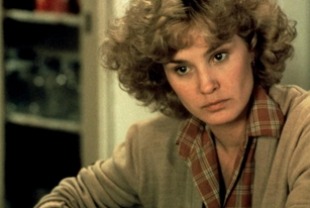In 1920, almost one out of every three people in the United States was a farm resident; today, the figure is only one in forty-one. Those identifying themselves as farmers have dwindled from 6 million in 1930 to 2.4 million today. Although some farmers are making money, many more are in deep financial trouble — especially those who in the late 1970s expanded their operations on the advice of the banks and the Farmers Home Administration (FmHA). Large numbers of these farmers now have a 70% debt-to-assets ratio. They are the victims of continuing high interest rates, increasing costs for farm supplies and machinery, and stable or falling prices for their products. The outlook for small to mid-size farms is very bleak. The countryside has become an area of fear and despair.
Country, directed by Richard Pearce and written by co-producer William D. Wittliff, is a compelling and important film which presents the anguish, stress and anger of one contemporary farm family faced with foreclosure. Academy Award-winner Jessica Lange, who conceived and co-produced the film, hopes that Country will "dramatize the plight of the people in the Midwest, who seem to have been forgotten by the rest of the nation."
Lange plays Jewell Ivy, a resourceful wife and mother who becomes an activist to save the land her ancestors have tilled for three generations. Sam Shepard is her husband Gil, a hard-working man who crumbles under the pressures which sweep over them like a wicked wind. Wilford Brimley is Otis Steward, Jewell's father, an old-fashioned individualist who believes that good farming has more to do with building character, a love of quality, and the care of all living things than it has to do with maximum production, mechanized labor, and agribusiness profits. David M. Walsh's cinematography and Charles Gross's music add to the emotional impact of Country.
